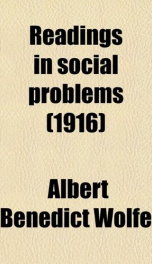readings in social problems

Purchase of this book includes free trial access to www.million-books.com where you can read more than a million books for free. This is an OCR edition with typos. Excerpt from book: BOOK I PROBLEMS OF POPULATION CHAPTER I THE MALTHUSIAN THEORY The theory of Malthus, 18. The fundamental principles, 20. The checks to population, 26. Moral restraint, 44. The effects of moral restraint, 51. Improvement of the condition of the poor through moral restraint, 59. Objections considered, 65. The responsibility of government, 69. Rational expectations of the future improvement of society, 72. [A population theory is a body of reasoned thought, based so far as the state of knowledge permits, upon known facts, with regard to the motives and causes which, in the absence of conscious individual direction or social control, govern the perpetuation and the increase of the human species. Such a theory may give primary emphasis to biological, to economic, to psychic, or to social forces, but it will not be a theory which approaches the truth nearly unless it recognizes and tries to give due weight to all these factors. A population theory, moreover, will be a mere academic exercise unless it attempts to show the ethical implications and results of the outworking of unguided natural forces and tendencies, and offers some practical suggestion for Spbviating undesirable and detrimental results, either through en- ' couraging in the individual an intelligent and informed sense of social responsibility, or through the development of a more or less authoritative social control over population growth. When the need to regulate population either to stimulate or to retard growth becomes consciously recognized by a people or by their leaders, the measures adopted or recommended for the accomplishment of this practical end constitute a population policy.Every policy rests upon some sort of thec.'y. ' w -.r crude, superficial, or traditional. Population p...
Info about the book
Author:
Series:
Unknown
ISBN:
1599410591
Rating:
4.5/5 (4)Your rating:
0/5
Languge:
English
Users who have this book
Users who want this book
What readers are saying
What do you think? Write your own comment on this book!
write a commentif you like readings in social problems try:
Other books by this author
Do you want to read a book that interests you? It’s EASY!
Create an account and send a request for reading to other users on the Webpage of the book!



